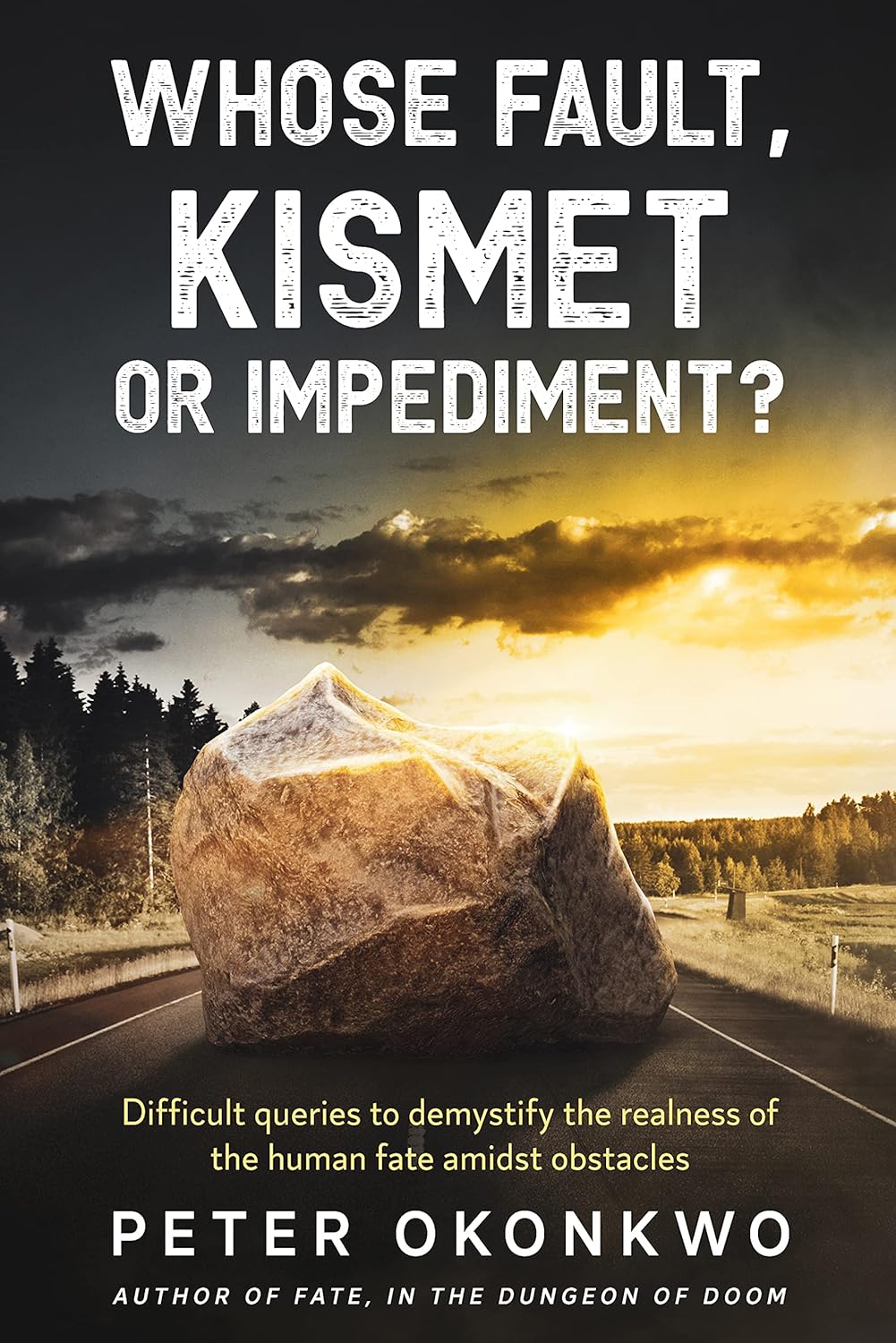WHOSE FAULT, KISMET OR IMPEDIMENT? a chronicle of lamentations

Title: Whose Fault, Kismet or Impediment?
Author: Peter Okonkwo
No. of Pages: 184
Genre: Poetry
Year of Publication: 2021
ISBN: 9-798-4151-0104-7
Reviewer: Iliya Kambai Dennis
Your life is a battlefield. You have fought many times; still fighting to become a contradiction of your past and current dilemma. Last two nights—after your boss ushered your retrenchment letter—you contemplated your relationship with bad luck. You probed your spirituality. Something must be wrong with you. Or something must be wrong with God’s plan. Why does every good thing only last long in your dream? Who is responsible for your misfortune. “I’m all alone, not one understands,” you thought. But you are wrong. You’re not alone. Among the many people who have had a share of your kind of pain, who understands the mechanism of such wars, Peter Okonkwo offers his intentional philosophic collection, “Whose Fault, Kismet or Impediment?” in solidarity.
Addressing ‘obstacle’ in the opening poem, “A Conversation with Obstacle” the poet asked, what is your mission in a man’s life? (page 28). Who would claim has not experienced the piercing claws of obstacle at some point in life’s journey? Is there anyone who hasn’t asked this question before?
The problem of impediment in people’s life is a universal phenomenon: it’s like death. Inevitable. How many times have you been betrayed by hope because something unexpected happened at the verge of succeeding or breaking a milestone? Questions erupt: Why now? Why me? Exclamations emerge: Not now! Not again! How long must I continue this way! You become destitute. Weak. If not well managed, depression dumps and settles in the mind. Then suicidal thoughts would start creeping in. Or you’ll seek alternatives means of bypassing the natural law of success like ‘get rich quick’ schemes.
Sometimes when you’re faced with such dilemmas, you question the existence of God and his promises of a better life for you. For instance, you believe that: “God is our Shephard; we shall not want.” Also, “God’s plan for us is not for evil but to prosper us and give us a future.” Yet there is no place that says everything will fall in place while you snore in your sleep—there has never been a successful person who didn’t pass through the agonizing toil of obstacle and impediment. You’d see this in the line: Wasn’t he, himself, crucified before resurrection? (page 115)
Here, in this collection, Peter Okonkwo provokes you to question the existence of obstacle. And by extension, the potency of God. Even though some Christians may find some of the poems in this collection unacceptable because they challenge their faith, but when they patiently read through, they’d be mesmerized at the wisdom of the poet.
In his offering, Peter Okonkwo gives you a chronicle of thought-provoking poems to ponder on. The poetry collection has a total number of thirty-four (34) poems. Divided into two parts, the first part is an exegesis on the phenomenon of obstacle. A lamentation, confrontation, and an interrogation.
The opening poem, “A Conversation with Obstacle” the persona confronts obstacle and its activities in people’s life, for example:
You’ve truncated and/ destroyed many destinies; /You’ve killed much hope/ and yet bury them;/ I have a question for you – /What is your mission/ in a man’s life? … / who exactly are you? /a spirit or a fiend? (page 28-29)
The persona’s confrontation and questions are pertinent as anyone who has experienced the disastrous effect of impediment would agree. The use of rhetorical questions in the collection emphasizes how lost you tend to become when faced with circumstances beyond your control; the quest to search for answers you most times embark on, which if care is not taken, you lost yourself completely to destruction.
But whose fault is it when you’ve prayed and cried out yet, languish in desperation? (page 65). This is a question to ponder upon as asked in the poem that birthed the title of the collection, “Whose Fault, Kismet or Impediment?” ‘Kismet,’ the idea that your life has been predestined, therefore you have no control over it. You’re left at the mercy of fate. Not your wisdom. Yet, in the poem, “Thanks to Obstacles” the persona becomes thankful for the blockages created by kismet or impediment because they make him stronger if the lessons presented are well learned.
The second part of the book explores a variety of themes such as friendship, hope, betrayal, death, and grief.
The collection uses literary devices such as repetition, rhetorical question, idiomatic expressions to drive its points and bring the reader to a point of self-examination. It’s a prosaic and philosophical collection full of wisdom like the one in Ecclesiastics.
In all, if you have been lost in between crossroads because of some predicaments and have wondered where you got it wrong, where your faith became little, where your fate played a major role, then this collection will guide you through its long easy written narrative poems engrossed with wisdom.
Bio
Iliya Kambai Dennis is a writer and poet from Kaduna. He has been published in The MUSE, Persephone’s Fruit, Naked Cat, Salamander Ink Magazine, Feral: A Journal of Poetry and Art, Serotonin, Konya Shamsrumi, African Writer, The African Writer Review, Afreecan Read, and more. He is the author of the chapbooks Songs We Sing Before We Sleep (WRR Chapbook Series), and Verses (Inkspired), and Litany of Longing (Konya Shamsrumi). He tweets @SonOfMalpauliya.